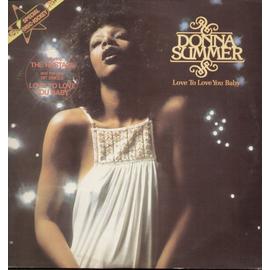

Perhaps Bad Girls belongs on it – check the guitar, horns and backing vocals – but if it is a homage, it’s of the highest quality: the song is well up to the standards of its chief influence.

There is a whole sub-genre of disco consisting of other producers attempting to mimic the Chic sound see DJ Dave Lee’s 2015 compilation of knock-off singles, Le Freak.

Love’s Unkind, meanwhile, is a glorious girl-group pastiche: dancefloor beat, melody as sweet and snappy as bubblegum. I Remember Yesterday was another concept album, this time with each track representing a different era of music (I Feel Love was supposed to symbolise the future, a brief it more than fulfilled). A terrific song, brilliantly delivered and a highlight of Summer’s post-Moroder career. Dinner With Gershwin was more straightforward, but still off-beam by late 80s pop standards. The jazz-influenced soul of singer-songwriter Brenda Russell was strikingly original –her 1979 single Way Back When sounds like prog disco, if such a thing can be imagined. Its sound is very 1983 – glossy pop-rock – but something about her vocal and the lyrics, apparently inspired by seeing an exhausted restroom attendant at an expensive restaurant, cuts through. Rolling Stone magazine wrote in 2003: “Madonna’s career without Summer and ‘Bad Girls’? Unthinkable.Perhaps the fact that she was mired in a costly legal battle with her record company lent Summer’s vocal its edge on She Works Hard for the Money. Yet it was her more raucous early work that influenced generations of female performers. She became a born-again Christian by the mid-1980s, and many of her later songs had religious themes. As she leaned out, her foot got caught in the drapes, preventing her fall. She wrote in her 2003 memoir that she climbed onto the windowsill of her Central Park hotel room. Summer’s success in the late 1970s, she suffered from depression and attempted suicide. Besides Sudano, survivors include a daughter from her first marriage and two daughters from her second marriage.Īmid Ms. Summer married musician and producer Bruce Sudano. In Germany, she married Austrian actor Helmut Sommer and changed her last name to Summer. 31, 1948, and grew up in Boston, where her father worked as a butcher, janitor and electrician. After “a salacious guitar-drenched rendition of ‘Hot Stuff,’ ” Billboard wrote, “fans rushed down the red carpeted aisles toward the stage.” Her electrifying performances were known to draw sellout crowds.ĭuring a 1998 concert at Carnegie Hall in New York, Billboard magazine wrote that after two hours of raucous - but polite - ovations, the audience couldn’t take it anymore.

Summer’s lasting popularity was buoyed by legions of black, Latin and gay fans. She quickly returned to the restroom and began composing the song on toilet paper. “And my first thought was, ‘God, she works hard for her money, that lady,’ ” Ms. She was at a Grammy Awards party when she spotted the women’s restroom attendant asleep from exhaustion. Summer said her 1983 hit “She Works Hard For the Money” was inspired by a trip to the restroom. 1 on the Billboard top 200, powered by hits including “Hot Stuff” and the catchy, horn-infused “Bad Girls.” She found greater success with the 1978 album “Live and More,” which featured her singing concert versions of “MacArthur Park,” popularized by actor Richard Harris, and “Last Dance.” Summer returned to the United States in 1975 as one of disco’s shining stars. Propelled by “Love to Love You Baby,” Ms. Summer, citing her upbringing in a strict and religious household, said she approached the song as a piece of theater and was merely acting her part.) Summer’s sultry moans, breathy singing and sexually explicit lyrics - “Do it to me again and again” - the song became an instant hit in discotheques and underground clubs. She had minor success in Europe during the early 1970s singing “The Hostage” and “Lady of the Night” before exploding to stardom with the 17-minute opus “Love to Love You Baby.” The song was a disco rendition of the 1960s Serge Gainsbourg and Jane Birkin erotic duet “Je T’Aime.
#THE HOSTAGE DONNA SUMMER PROFESSIONAL#
Summer launched her professional career in the late 1960s by moving to Europe to sing in a production of the rock musical “Hair.” She spent eight years overseas performing in stagings of “Godspell” and “Porgy and Bess” and eventually met producers Giorgio Moroder and Pete Bellotte. Summer “made some of the freshest, most substantial dance records of a period noted for its froth and foolishness.” In a 1984 assessment of her career, Times pop music critic Robert Palmer wrote that Ms. She co-wrote many of her hip-gyrating disco tunes. Trained initially in gospel singing, she had a remarkable range and accumulated five Grammy Awards for singing rock, rhythm and blues, gospel and dance music.


 0 kommentar(er)
0 kommentar(er)
